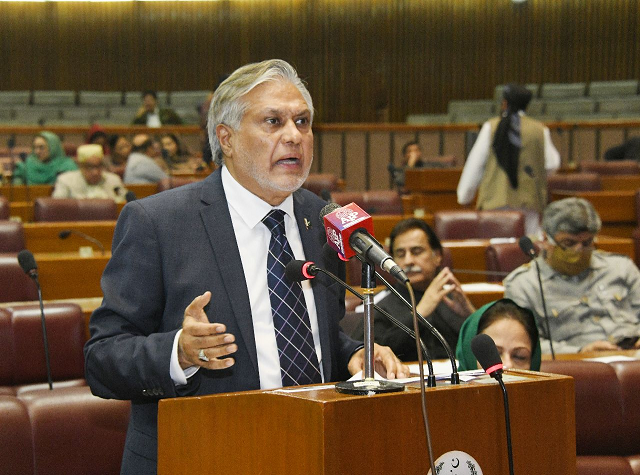NA passes Rs170b mini-budget to meet IMF terms
Move to push people deeper into poverty trap

The National Assembly on Monday passed the Rs170 billion mini-budget with some tinkering, bringing Pakistan closer to the staff-level agreement with the International Monetary Fund (IMF), but at the cost of pushing people deeper into the poverty trap.
The lower house of parliament approved the budget with majority vote in a house devoid of genuine opposition voices. The approval has given effect to the new taxation measures of Rs170 billion, having an annual impact of about Rs550 billion.
The majority of the taxation measures have already been implemented, although the president has yet to give his assent to the bill passed by the National Assembly.
Read: Rs170b mini-budget to spur inflation
In his wind-up speech, Finance Minister Ishaq Dar admitted that “inflation was unbearable for the people” but threw the blame on the maladministration of the previous government of former prime minister Imran Khan.
Finally, Dar admitted that the news stories about Rs675 billion to Rs700 billion taxes were not untrue and the IMF had demanded those measures, which the government did not accept.
“After the approval of the budget, we are very near to the staff-level agreement,” said Dar, while briefly speaking to the media. He added that almost all major issues with the IMF were sorted out.
The major remaining actions before the IMF board approval of the loan tranche of $1.1 billion, include increase in the interest rates and irrevocable commitments by the regional countries to provide fresh loans to Pakistan to keep it afloat.
Once the process of the 9th review is completed by the end of next month, Pakistan and the IMF will begin talks for the next two programme reviews.
During the last day of the budget session, the legislators appeared more concerned about President Arif Alvi’s action to announce election dates for the provincial assemblies of Khyber-Pakhtunkhwa and Punjab. They spent very little time on the implications of the budget, indicating their priorities.
After the approval of the budget, the country will be on fire from Karachi to Chitral, MNA Maulana Abdul Akbar said while highlighting the adverse implications of increasing the GST rate to 18%.
The Finance Supplementary Act has given permanent legal cover to an increase in the general sales tax (GST) from 17% to 18% apart from increasing the federal excise duty on sugary items, tobacco, airline tickets, marriage halls and cement.
The government has already enforced the increase in GST through an administrative approval from the federal cabinet.
The act has given cover to the new FED rate at Rs16,500 – an increase of Rs10,000 or 153%. Per-cigarette FED rate has been increased from Rs6.5 to Rs16.50 for expensive brands. The minimum price cap for the expensive brand has also been increased from Rs6,600 to over Rs9,000.
The government has introduced another clause, which would bind the tobacco manufacturing companies not to declare the expensive cigarette brands as less expensive brands aimed at plugging loopholes for any tax evasion.
Also read: Tax the rich, help the poor, IMF advises Pakistan
For the less expensive brands of below Rs9,000 per 1,000 cigarettes, the per-1,000 cigarette tax has been increased to Rs5,050 – up from Rs2,550. There is an increase of 98% in the tax for this category. Per-cigarette tax has been increased from Rs2.55 to Rs5.05.
The government increased the FED rate on sugary drinks, beverages to 20% – up from 13%. It has increased the FED on juices to 10% in the first phase. About Rs7 billion will be collected from the increase in the FED on beverages.
The government did not accept the United States embassy pressure, which was advocating reversal in increase in the FED rate for beverages.
A 10% advance adjustable income tax has been imposed on social functions and gatherings. It has imposed an advance adjustable income tax of 10% on sale consideration on off-market disposal of shares aimed at generating Rs5 billion in additional taxes.
The government has further increased the FED on international air travel in club, business, and first classes. It has set the rate at Rs250,000 on first and business class tickets of North, Central and South America. The per ticket FED on travellers to Far East, Australia, New Zealand and Pacific Islands has been fixed at Rs150,000 while the rate is Rs75,000 for travellers to Middle East and Africa. The government is expected to collect additional Rs8 billion from international travellers in the next four months.
The FED on cement has been increased from Rs1.50 per kilogramme to Rs2 per kilo, which will increase the 50kg bag price by Rs25.
Dar said that his economic team had hectic talks with the IMF to revive the programme, during which it agreed to take some tough decisions for streamlining the deteriorating condition of the economy.
He said the new revenue measures would not affect the poor segments of society. In order to help the poor cope with the rising inflation, he said the government had also proposed a Rs40 billion increase in the budget of the Benazir Income Support Programme (BISP).
However, the Rs40 billion additional funds have been given to largely clear the arrears of the BISP, as no new benefits are given to tackle the impact of the highly inflationary budget.
Dar hoped that the FBR will meet this fiscal year’s tax collection target, which is now Rs7.640 trillion. He reiterated that the additional proposed tax measures of Rs170 billion were not meant to bridge the gap of the collection target, rather the same would help minimise the budget deficit for the current fiscal year.
He said the IMF was much concerned over the huge losses, such as the power sector which was facing losses of around Rs1.45 trillion per year. He said the cost of electricity generation was Rs3 trillion but the collection was only Rs1.55 trillion due to line losses, theft and less recovery of the bills.
The minister said that both houses of parliament talked about reducing the expenses and the prime minister would give a comprehensive roadmap in the coming days for austerity measures.
Dar also criticised the economic policies of the previous government, saying that poor management and lack of fiscal discipline damaged the economy.
He said that the PTI government did not fulfil its commitments with the IMF and sabotaged the economy before its ouster. It was the obligation of the state to honour the agreement signed with the IMF so the incumbent government was implementing conditions agreed by the last PTI government.



















COMMENTS
Comments are moderated and generally will be posted if they are on-topic and not abusive.
For more information, please see our Comments FAQ